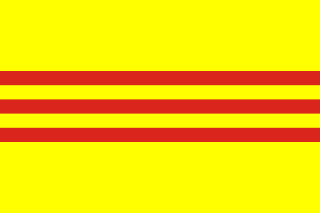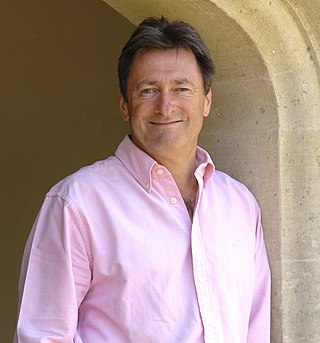Related Research Articles

South Vietnam, officially the Republic of Vietnam was a country in Southeast Asia that existed from 1955 to 1975, the period when the southern portion of Vietnam was a member of the Western Bloc during part of the Cold War after the 1954 division of Vietnam. It first received international recognition in 1949 as the State of Vietnam within the French Union, with its capital at Saigon, before becoming a republic in 1955. South Vietnam was bordered by North Vietnam to the north, Laos to the northwest, Cambodia to the southwest, and Thailand across the Gulf of Thailand to the southwest. Its sovereignty was recognized by the United States and 87 other nations, though it failed to gain admission into the United Nations as a result of a Soviet veto in 1957. It was succeeded by the Republic of South Vietnam in 1975. In 1976, the Republic of South Vietnam and North Vietnam merged to form the Socialist Republic of Vietnam.

The Viet Cong was an epithet to call the communist movement and united front organization in South Vietnam, Laos and Cambodia. Formally organized as and led by the National Liberation Front of South Vietnam, it fought under the direction of North Vietnam against the South Vietnamese and United States governments during the Vietnam War. The organization had both guerrilla and regular army units, as well as a network of cadres who organized and mobilized peasants in the territory the Viet Cong controlled. During the war, communist fighters and some anti-war activists claimed that the Viet Cong was an insurgency indigenous to the South, while the U.S. and South Vietnamese governments portrayed the group as a tool of North Vietnam. It was later conceded by the modern Vietnamese communist leadership that the movement was actually under the North Vietnamese political and military leadership, aiming to unify Vietnam under a single banner.

The First Indochina War was fought between France and Việt Minh, and their respective allies, from 19 December 1946 until 20 July 1954. Việt Minh was led by Võ Nguyên Giáp and Hồ Chí Minh. Most of the fighting took place in Tonkin in Northern Vietnam, although the conflict engulfed the entire country and also extended into the neighboring French Indochina protectorates of Laos and Cambodia.

Alan Fred Titchmarsh HonFSE is an English gardener and broadcaster. After working as a professional gardener and a gardening journalist, he became a writer, and a radio and television presenter.

Timothy John Page was a British photographer. He was noted for the photos he took of the Vietnam War, and was later based in Brisbane, Australia.

Hamish MacInnes was a Scottish mountaineer, explorer, mountain search and rescuer, and author. He has been described as the "father of modern mountain rescue in Scotland". He is credited with inventing the first all-metal ice-axe and an eponymous lightweight foldable alloy stretcher called MacInnes stretcher, widely used in mountain and helicopter rescue. He was a mountain safety advisor to a number of major films, including Monty Python and the Holy Grail,The Eiger Sanction and The Mission. His 1972 International Mountain Rescue Handbook is considered a manual in the mountain search and rescue discipline.

CHERUB is a series of teenage spy novels written by English author Robert Muchamore, focusing around a fictional division of the British Security Service called CHERUB, which employs children, predominantly orphans, 17 or younger as intelligence agents.
The battle of Nam Đông took place from July 5–6 1964 during the Vietnam War, when the Viet Cong (VC) and People's Army of Vietnam (PAVN) attacked the Nam Đông CIDG camp in an attempt to overrun it. During the battle, 57 South Vietnamese defenders, two Americans, an Australian Military advisor, and at least 62 attackers were killed.

Martyn Burke is a Canadian director, novelist and screenwriter from Toronto, Ontario.
Max Arthur OBE was a military historian, author and actor who specialised in first-hand recollections of the twentieth century. In particular his works focussed on the First and Second World War.
Christopher Anderson was a Scottish footballer, educator and football administrator. He is best remembered for his time as vice-chairman of Aberdeen F.C., where he was regarded as one of the game's most forward-thinking and innovative characters. Anderson was appointed an Officer of the Order of the British Empire (OBE) in the 1981 Birthday Honours, and was inducted into the Aberdeen FC "Hall of Fame" as one of the founding members in 2003.
Julian Saul David is a British academic military historian and broadcaster. He is best known for his work on the Indian Rebellion of 1857 and the Anglo-Zulu War, as well as for presenting and appearing in documentaries on British television covering imperial and military themes.
Philip John Purser was a British television critic and novelist.
Trần Văn Thủy is an Vietnamese documentary film director, reporter, and writer. He has directed more than twenty documentary films on a wide variety of themes. His work has often been a center of controversy in Vietnam; his 1982 film Hanoi In Whose Eyes, and his 1985 film The Story of Kindness, were both banned for a number of years by the Vietnamese government because each had content that was implicitly critical of the regime. Nonetheless, due in large measure to the success of his work at international film festivals, Thủy was able to continue working for the Government Cinema department as a creator of significant films, including A Story From the Corner of the Park (1996), and The Sound of a Violin at Mỹ Lai (1999).
Charley Trujillo is a Chicano novelist, editor, publisher, and filmmaker. He is known for his novel and documentary Soldados: Chicanos in Việt Nam.
Beryl Fox is a Canadian documentary film director and producer.
Ronald Frame is a Scottish novelist, short story writer, and dramatist. He was educated in Glasgow, and at Oxford University.
The Mills of the Gods: Viet Nam is a 1965 Canadian documentary film directed by Beryl Fox and narrated by Bernard B. Fall. Made in the direct cinema style, the film documents the Vietnam War.

John Laurence is an American television correspondent, author, print reporter and documentary filmmaker. He is known for his work on the air at CBS News, London correspondent for ABC News, documentary work for PBS and CBS, and his book and magazine writing. He won the George Polk Memorial Award of the Overseas Press Club of America for "best reporting in any medium requiring exceptional courage and enterprise abroad" for his coverage of the Vietnam War in 1970.
The tradition of photography started in the 19th century in Vietnam and has since then given rise to modern photography and photojournalism into the 20th century.